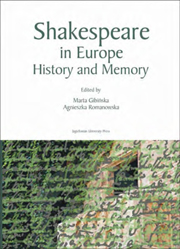Book contents
- Frontmatter
- Contents
- Preface
- Towards a European History of Henry V
- History and Histories
- History and Memory: Criticism and Reception
- “Strictly Ideal:” Shakespeare's Personality as a Historical Construct in Nathan Drake's Noontide Leisure
- Shylock and the Shrew: Victorian Shakespeare and Nineteenth-Century Spain
- “Memory of the Text.” Wyspiański's Hamlet
- “Happily they had no Choice:” Shakespeare's Elizabethan Audience and the Ideal of a Unified Cultural Sphere, C. 1920–1950
- History, Memory, and Ideological Appropriation
- Theatre: The Act of Memory and History in the Making
- Index of Authors
“Strictly Ideal:” Shakespeare's Personality as a Historical Construct in Nathan Drake's Noontide Leisure
from History and Memory: Criticism and Reception
Published online by Cambridge University Press: 05 September 2014
- Frontmatter
- Contents
- Preface
- Towards a European History of Henry V
- History and Histories
- History and Memory: Criticism and Reception
- “Strictly Ideal:” Shakespeare's Personality as a Historical Construct in Nathan Drake's Noontide Leisure
- Shylock and the Shrew: Victorian Shakespeare and Nineteenth-Century Spain
- “Memory of the Text.” Wyspiański's Hamlet
- “Happily they had no Choice:” Shakespeare's Elizabethan Audience and the Ideal of a Unified Cultural Sphere, C. 1920–1950
- History, Memory, and Ideological Appropriation
- Theatre: The Act of Memory and History in the Making
- Index of Authors
Summary
Like all branches of learning, literary criticism is subject to historically determined fashions. Latterly, the “death of the author” has made it difficult to discuss literary works in the light of the writer's life and personality. If any outside determinants are accepted at all, it is the large impersonal discourses that rule the individual author, and percolate through him into texts. However, in his recent immensely readable but rather speculative biography Will in the World, Stephen Greenblatt seems to herald the return of the author. Whether the book, which reads like a novel, will really help to bring about the return of the author, be it as a man of his age rather than as a towering genius, remains to be seen. However, it is a salutary reminder of the relativity of critical verities. Indeed, in some respects it harks back to an earlier age, when the only criticism that was taken seriously was biographical criticism. As I will argue, in the nineteenth century criticism and biography were so close that even a historical novel based on state of the art scholarship could form a contribution to the critical debate about Shakespeare.
From the late seventeenth century onwards, Shakespeare has occasionally been used as a literary character. The earliest cases nearly invariably feature Shakespeare's ghost descending from heaven to admonish or bless actors and stage managers who put on his plays. Usually this takes place in marginal forms, such as prologues and epilogues to rewrites of his plays, short sketches, or satirical poems.
- Type
- Chapter
- Information
- Shakespeare in EuropeHistory and Memory, pp. 129 - 138Publisher: Jagiellonian University PressPrint publication year: 2008

